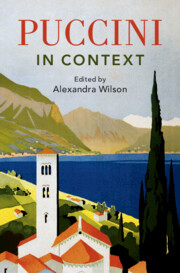Book contents
- Puccini in Context
- Composers in Context
- Puccini in Context
- Copyright page
- Contents
- Figures
- Table
- Notes on Contributors
- Preface
- Part I Formative Influences
- Part II Puccini’s Places
- Part III Influences and Interests
- Chapter 9 Musical Influences, Parallels, and Borrowings
- Chapter 10 Italian Literature of Puccini’s Day
- Chapter 11 Drama and Acting in Puccini’s Italy
- Chapter 12 Puccini and Early Film
- Chapter 13 Puccini and Technology
- Part IV Bringing Puccini to the Stage
- Part V Image and Reputation
- Part VI Puccini through a Political Lens
- Part VII Interpreting Puccini
- Part VIII Legacy
- Bibliography
- Index
Chapter 12 - Puccini and Early Film
from Part III - Influences and Interests
Published online by Cambridge University Press: 31 August 2023
- Puccini in Context
- Composers in Context
- Puccini in Context
- Copyright page
- Contents
- Figures
- Table
- Notes on Contributors
- Preface
- Part I Formative Influences
- Part II Puccini’s Places
- Part III Influences and Interests
- Chapter 9 Musical Influences, Parallels, and Borrowings
- Chapter 10 Italian Literature of Puccini’s Day
- Chapter 11 Drama and Acting in Puccini’s Italy
- Chapter 12 Puccini and Early Film
- Chapter 13 Puccini and Technology
- Part IV Bringing Puccini to the Stage
- Part V Image and Reputation
- Part VI Puccini through a Political Lens
- Part VII Interpreting Puccini
- Part VIII Legacy
- Bibliography
- Index
Summary
This chapter examines Puccini’s relationship with early film. The composer’s career coincided with nearly the first thirty years of the cinematic art form, and it was a form of technology with which Puccini had an ambivalent relationship. The chapter begins with an account of Puccini’s known thoughts about film and cinema going. There follows an extensive discussion of Puccini’s and Ricordi’s legal efforts to prevent the use of his music as film accompaniment, and of the difficulty in recouping royalties. By the 1920s, however, Ricordi was including a clause about film usage in opera contracts, including that for Turandot. From the 1930s, with the arrival of the ‘talkies’, commercial opportunities became apparent and the company pursued a more liberal course. The chapter also considers how Puccini’s operas were brought to the screen during his lifetime and shortly after – there was a particular vogue for Tosca films – and discusses the ways in which the composer’s works might be considered ‘cinematic’.
- Type
- Chapter
- Information
- Puccini in Context , pp. 97 - 104Publisher: Cambridge University PressPrint publication year: 2023

